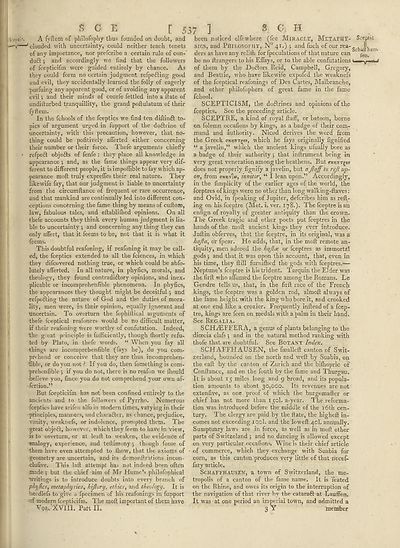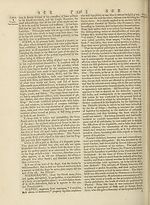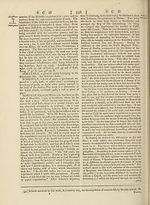Encyclopaedia Britannica, or, a Dictionary of arts, sciences, and miscellaneous literature : enlarged and improved. Illustrated with nearly six hundred engravings > Volume 18, RHI-SCR
(559) Page 537
Download files
Complete book:
Individual page:
Thumbnail gallery: Grid view | List view

S C E [ 337 ] S € H
Sceptic-. A fyflem of pliilofopliy thus founded on doubt, and
clouded with uncertainty, could neither teach tenets
of any importance, nor prefcribe a certain rule of con-'
du£l; and accordingly we find that the followers
of fcepticifm were guided entirely by chance. As
they could form no certain judgment refpefting good
and evil, they accidentally learned the folly of eagerly
purfuing any apparent good, or of avoiding any apparent
evil *, and their minds of courfe fettled into a date of
undifturbed tranquillity, the grand poftulatum of their
fyftem.
In the fchools of the fceptics we find ten diftinfl to¬
pics of argument urged in fupport of the dodtrine of
uncertainty, with this precaution, however, that no¬
thing could be pofitively afferted either conceiming
their number or their force. Thefe arguments chiefly
4 refpedi objedfs of fenfe : they place all knowledge in
appearance •, and, as the fame things appear very dif¬
ferent to different people, it is impoflible to fay which ap¬
pearance moft truly expreffes their real nature. They
likewife fay, that our judgment is liable to uncertainty
from the circumftance of frequent or rare occurrence,
and that mankind are continually led into different con¬
ceptions concerning the fame thing by means of cuftom,
law, fabulous tales, and eftabliflied opinions. On all
thefe accounts they think every human judgment is lia¬
ble to uncertainty ; and concerning any thing they can
only affert, that it feems to be, not that it is what it
feems.
This doubtful reafoning, if reafoning it may be call¬
ed, the fceptics extended to all the fciences, in which
they difcovered nothing true, or which could be abfo-
lutely afferted. In all nature, in phyfics, morals, and
theology, they found contradidlory opinions, and inex¬
plicable or incomprehenfible phenomena. In phyfics,
the appearances they thought might be deceitful ; and
refpedting the nature of God and the duties of mora¬
lity, men were, in their opinion, equally ignorant and
uncertain. To overturn the fophiftical arguments of
thefe fceptical reafoners would be no difficult matter,
if their reafoning were worthy of confutation. Indeed,
the g eat principle is fufficiently, though (hortly refu¬
ted by Plato, in thefc words. “ When you fay all
-things are incomprehenfible (fays he), do you com¬
prehend or conceive that they are thus incomprehen-
fible, or do you not ? If you do, then fomething is com-
prehenfible *, if you do not, there is no reafon we ffiould
believe you, fince you do not comprehend your own af-
•fertion.”
But fcepticifm has not been confined entirely to the
ancients and to the followers of Pyrrho. Numerous
fceptics have arifen alfo in modern times, varying in their
principles, manners, and character, as chance, prejudice,
vanity, weaknefs, or indolence, prompted them. The
great object, however, which they feem to have in view,
is to overturn, or at leail to weaken, the evidence of
analogy, experience, and teftimony-j though fome of
them have even attempted to (how, that the axioms of
geometry are uncertain, and its demonftrations incon-
clufive. This laft attempt has not indeed been often
made ; but the chief aim of Mr Hume’s philofophical
writings is to introduce doubts into every branch of
phyjics, metaphysics, hi/lory, ethics, and theology. It is
heedlefs to give a fpecimen of his reafonings in fupport
of modern fcepticifm. The moft important of them have
Vot/XVIIL Part II.
been noticed elfevvhere (fee Miracle, MeTAPHY- Sceptic
sics, and Philosophy, N° 41.) \ and fuch of our rea* schajjha\r
ders as have any relilh for fpeculations of that nature can fen>
be no ftrangers to his Effays, or to the able confutations
of them by the -Doctors Reid, Campbell, Gregory,
and Beattie, who have likewife expofed the weaknefs
of the fceptical reafonings of Des Cartes, Malbranche,
and other philofophers of great fame in the fame
fchool.
SCEPTICISM, the do&rines and opinions of the
fceptics. See the preceding article. .
SCEPTRE, a kind of royal (faff, or batoon, borne
on folemn occafions by kings, as a badge of their com¬
mand and authority. Nicod derives the word from
the Greek <ncij7!Tg»v, which he fays originally fignified
“ a javelin,” which the ancient kings ufually bore as
a badge of their authority 5 that inffrument being in
very great veneration among the heathens. But
does not properly fignify a javelin, but a JlaJJ to reft up¬
on, from c-KYiTrlt), innitor, “ I lean upon.” Accordingly,
in the fimplicity of the earlier ages of the world, the
fceptres of kings were no other than long walking-flaves:
and Ovid, in fpeaking of Jupiter, defcribes him as reft-
ing on his fceptre (Met. i. ver. 178.). Thefceptre is an
enfign of royalty of greater antiquity than the crown.
The Greek tragic and other poets put fceptres in the
hands of the mod ancient kings they ever introduce.
Judin obferves, that the fceptre, in its original, was a
hajla, or fpear. He adds, that, in the mod remote an¬
tiquity, men adored the hajlcc or fceptres as immortal
gods $ and that it was upon this account, that, even in
his time, they dill furniffied the gods with fceptres^*—
Neptune’s fceptre is his trident. Tarquin the Elder was
the fird who affumed the fceptre among the Romans. Le
Gendre tells us, that, in the fird race of the French
kings, the fceptre was a golden rod, almod always of
the fame height with the king who bore it, and crooked
at one end like a crozier. Frequently indead of a fcep¬
tre, kings are feen on medals with a palm in their hand.
See Regalia.
SCHiEFFERA, a genus of plants belonging to the
dioeeia clafs; and in the natural method ranking with
thofe that are doubtful. See Botany Index.
SCHAFFHAUSEN, the fmalled canton of Swit¬
zerland, bounded on the north and wed by Suabia, on
the ead by the canton of Zurich and the bifliopric of
Condance, and on the fouth by the fame and Thurgau.
It is about 15 miles long and 9 broad, and its popula¬
tion amounts to aboctt 30,000. Its revenues are not
extenfive, as one proof of which the burgomader or
chief has not more than 150I. a-year. The reforma¬
tion was introduced before the middle of the 16th cen¬
tury. The clergy are paid by the date, the highed in¬
comes not exceeding loci, and the lowed 40!. annually.
Sumptuary laws are in force, as well as in mod other
parts of Switzeland ; and no dancing is allowed except
on very particular occafions. Wine is their chief article
of commerce, which they exchange with Suabia for
corn, as this canton produces very little of that necef-
fary article.
ScHAFFHAUSEN, a town of Switzerland, the me¬
tropolis of a canton of the fame name. It is feated
on the Rhine, and owes its origin to the interruption of
the navigation of that river by the cataraft at Lauffen.
It was at one period an imperial town, and admitted a
3 Y member
Sceptic-. A fyflem of pliilofopliy thus founded on doubt, and
clouded with uncertainty, could neither teach tenets
of any importance, nor prefcribe a certain rule of con-'
du£l; and accordingly we find that the followers
of fcepticifm were guided entirely by chance. As
they could form no certain judgment refpefting good
and evil, they accidentally learned the folly of eagerly
purfuing any apparent good, or of avoiding any apparent
evil *, and their minds of courfe fettled into a date of
undifturbed tranquillity, the grand poftulatum of their
fyftem.
In the fchools of the fceptics we find ten diftinfl to¬
pics of argument urged in fupport of the dodtrine of
uncertainty, with this precaution, however, that no¬
thing could be pofitively afferted either conceiming
their number or their force. Thefe arguments chiefly
4 refpedi objedfs of fenfe : they place all knowledge in
appearance •, and, as the fame things appear very dif¬
ferent to different people, it is impoflible to fay which ap¬
pearance moft truly expreffes their real nature. They
likewife fay, that our judgment is liable to uncertainty
from the circumftance of frequent or rare occurrence,
and that mankind are continually led into different con¬
ceptions concerning the fame thing by means of cuftom,
law, fabulous tales, and eftabliflied opinions. On all
thefe accounts they think every human judgment is lia¬
ble to uncertainty ; and concerning any thing they can
only affert, that it feems to be, not that it is what it
feems.
This doubtful reafoning, if reafoning it may be call¬
ed, the fceptics extended to all the fciences, in which
they difcovered nothing true, or which could be abfo-
lutely afferted. In all nature, in phyfics, morals, and
theology, they found contradidlory opinions, and inex¬
plicable or incomprehenfible phenomena. In phyfics,
the appearances they thought might be deceitful ; and
refpedting the nature of God and the duties of mora¬
lity, men were, in their opinion, equally ignorant and
uncertain. To overturn the fophiftical arguments of
thefe fceptical reafoners would be no difficult matter,
if their reafoning were worthy of confutation. Indeed,
the g eat principle is fufficiently, though (hortly refu¬
ted by Plato, in thefc words. “ When you fay all
-things are incomprehenfible (fays he), do you com¬
prehend or conceive that they are thus incomprehen-
fible, or do you not ? If you do, then fomething is com-
prehenfible *, if you do not, there is no reafon we ffiould
believe you, fince you do not comprehend your own af-
•fertion.”
But fcepticifm has not been confined entirely to the
ancients and to the followers of Pyrrho. Numerous
fceptics have arifen alfo in modern times, varying in their
principles, manners, and character, as chance, prejudice,
vanity, weaknefs, or indolence, prompted them. The
great object, however, which they feem to have in view,
is to overturn, or at leail to weaken, the evidence of
analogy, experience, and teftimony-j though fome of
them have even attempted to (how, that the axioms of
geometry are uncertain, and its demonftrations incon-
clufive. This laft attempt has not indeed been often
made ; but the chief aim of Mr Hume’s philofophical
writings is to introduce doubts into every branch of
phyjics, metaphysics, hi/lory, ethics, and theology. It is
heedlefs to give a fpecimen of his reafonings in fupport
of modern fcepticifm. The moft important of them have
Vot/XVIIL Part II.
been noticed elfevvhere (fee Miracle, MeTAPHY- Sceptic
sics, and Philosophy, N° 41.) \ and fuch of our rea* schajjha\r
ders as have any relilh for fpeculations of that nature can fen>
be no ftrangers to his Effays, or to the able confutations
of them by the -Doctors Reid, Campbell, Gregory,
and Beattie, who have likewife expofed the weaknefs
of the fceptical reafonings of Des Cartes, Malbranche,
and other philofophers of great fame in the fame
fchool.
SCEPTICISM, the do&rines and opinions of the
fceptics. See the preceding article. .
SCEPTRE, a kind of royal (faff, or batoon, borne
on folemn occafions by kings, as a badge of their com¬
mand and authority. Nicod derives the word from
the Greek <ncij7!Tg»v, which he fays originally fignified
“ a javelin,” which the ancient kings ufually bore as
a badge of their authority 5 that inffrument being in
very great veneration among the heathens. But
does not properly fignify a javelin, but a JlaJJ to reft up¬
on, from c-KYiTrlt), innitor, “ I lean upon.” Accordingly,
in the fimplicity of the earlier ages of the world, the
fceptres of kings were no other than long walking-flaves:
and Ovid, in fpeaking of Jupiter, defcribes him as reft-
ing on his fceptre (Met. i. ver. 178.). Thefceptre is an
enfign of royalty of greater antiquity than the crown.
The Greek tragic and other poets put fceptres in the
hands of the mod ancient kings they ever introduce.
Judin obferves, that the fceptre, in its original, was a
hajla, or fpear. He adds, that, in the mod remote an¬
tiquity, men adored the hajlcc or fceptres as immortal
gods $ and that it was upon this account, that, even in
his time, they dill furniffied the gods with fceptres^*—
Neptune’s fceptre is his trident. Tarquin the Elder was
the fird who affumed the fceptre among the Romans. Le
Gendre tells us, that, in the fird race of the French
kings, the fceptre was a golden rod, almod always of
the fame height with the king who bore it, and crooked
at one end like a crozier. Frequently indead of a fcep¬
tre, kings are feen on medals with a palm in their hand.
See Regalia.
SCHiEFFERA, a genus of plants belonging to the
dioeeia clafs; and in the natural method ranking with
thofe that are doubtful. See Botany Index.
SCHAFFHAUSEN, the fmalled canton of Swit¬
zerland, bounded on the north and wed by Suabia, on
the ead by the canton of Zurich and the bifliopric of
Condance, and on the fouth by the fame and Thurgau.
It is about 15 miles long and 9 broad, and its popula¬
tion amounts to aboctt 30,000. Its revenues are not
extenfive, as one proof of which the burgomader or
chief has not more than 150I. a-year. The reforma¬
tion was introduced before the middle of the 16th cen¬
tury. The clergy are paid by the date, the highed in¬
comes not exceeding loci, and the lowed 40!. annually.
Sumptuary laws are in force, as well as in mod other
parts of Switzeland ; and no dancing is allowed except
on very particular occafions. Wine is their chief article
of commerce, which they exchange with Suabia for
corn, as this canton produces very little of that necef-
fary article.
ScHAFFHAUSEN, a town of Switzerland, the me¬
tropolis of a canton of the fame name. It is feated
on the Rhine, and owes its origin to the interruption of
the navigation of that river by the cataraft at Lauffen.
It was at one period an imperial town, and admitted a
3 Y member
Set display mode to:
![]() Universal Viewer |
Universal Viewer | ![]() Mirador |
Large image | Transcription
Mirador |
Large image | Transcription
Images and transcriptions on this page, including medium image downloads, may be used under the Creative Commons Attribution 4.0 International Licence unless otherwise stated. ![]()
| Permanent URL | https://digital.nls.uk/193025974 |
|---|
| Attribution and copyright: |
|
|---|
| Description | Ten editions of 'Encyclopaedia Britannica', issued from 1768-1903, in 231 volumes. Originally issued in 100 weekly parts (3 volumes) between 1768 and 1771 by publishers: Colin Macfarquhar and Andrew Bell (Edinburgh); editor: William Smellie: engraver: Andrew Bell. Expanded editions in the 19th century featured more volumes and contributions from leading experts in their fields. Managed and published in Edinburgh up to the 9th edition (25 volumes, from 1875-1889); the 10th edition (1902-1903) re-issued the 9th edition, with 11 supplementary volumes. |
|---|---|
| Additional NLS resources: |
|

